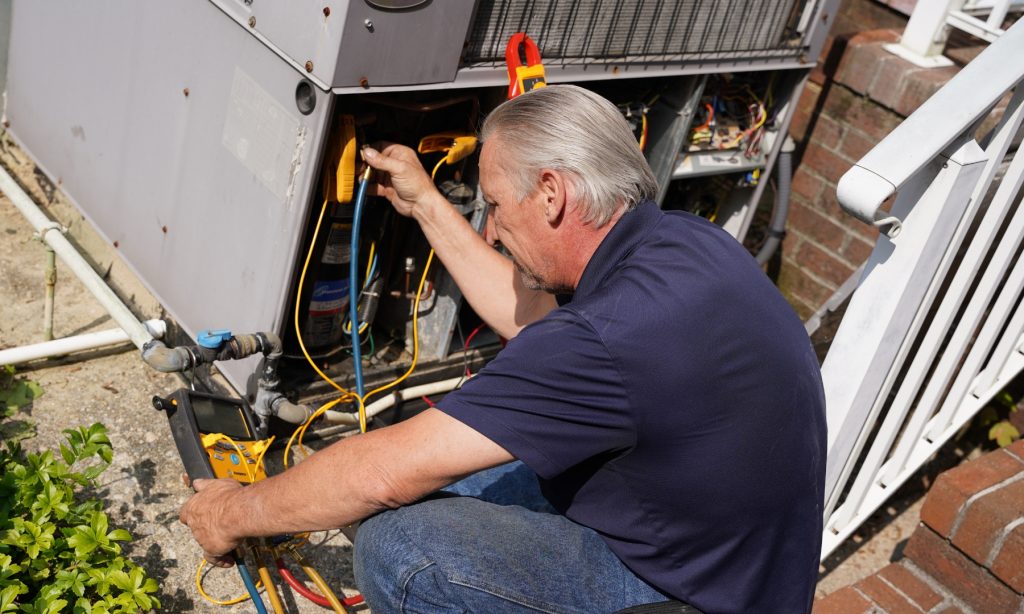HVAC Terms & Acronyms

The HVAC industry, otherwise known as heating, ventilation and air conditioning, uses a lot of specialized terms and abbreviations, which can be confusing for homeowners. While our Hampton Roads HVAC technicians will always take the time to explain the technical stuff and answer any questions you may have, we realize it still helps to have a glossary of HVAC terms and acronyms that you can refer to, whether you need HVAC maintenance, HVAC repairs or HVAC installation and replacement.
Common HVAC Terms
Air Handler – part of the HVAC system that holds the fan and is responsible for distributing the heated and cooled air throughout the home’s ventilation system. Learn more about air handlers.
Condenser Unit – the outdoor part of an air conditioner or heat pump that either releases or collects heat, depending on the type of system and the time of the year.
Compressor – part of the condenser unit responsible for circulating refrigerant through the HVAC system.
Refrigerant – fluid that changes state (liquid to gas) and temperature when pressurized, cooling as it evaporates and heating up as it condenses.
Evaporator Coil – part of the air handler responsible for removing heat from the air using a refrigerant that runs through copper tubing and cools the air as it evaporates.
Condenser Coil – part of the condenser unit that works with the indoor evaporator coil to transfer heat and from inside the home and release it outdoors.
Blower Motor – an electrical component that is responsible for driving the fan that circulates warm and cool air throughout the home’s ventilation system.
Capacitor – an electrical component that stores energy and provides a jolt of power to help the compressor and fan motors start and run smoothly
Contactor – an electromechanical switch that controls the flow of electricity to various components, like the compressor and fan motor.
Common HVAC Acronyms
BTU (British Thermal Unit) – a unit of energy used to measure the cooling or heating capacity of a HVAC system. The higher the BTU rating, the more powerful the system.
EER (Energy Efficiency Rating) – the ratio of cooling or heating capacity to the power input in watts. The higher the EER rating, the more efficient the air conditioner.
SEER (Seasonal Energy Efficiency Rating) – a measure of how efficiently a HVAC system cools a home over a typical cooling season. The higher the SEER rating, the less energy the unit will use.
HSPF (Heating Seasonal Performance Factor) – a measure of how efficiently a HVAC system heats a home over a typical heating season. The higher the HSPF rating, the more efficient the unit.
AFUE (Annual Fuel Utilization Efficiency) – a measure of how efficiently a furnace or boiler converts fuel into warm air for your home. The higher the AFUE rating, the less fuel the unit will use.
CFM (Cubic Feet Per Minute) – a measure of how much air flows through a specific point in an HVAC system in one minute, ensuring the HVAC system is sized correctly to meet the needs of a space.
IAQ (Indoor Air Quality) – refers to the condition of the air in the home, especially as it relates to health and comfort.
HEPA (High Efficiency Particulate Air) – a HEPA filter can remove smaller particles from the air than a standard filter can. These are important for people who suffer from allergies.
Ask Our Hampton Roads HVAC Experts
By familiarizing yourself with these HVAC terms and acronyms, you’ll have a better understanding of your HVAC system’s components and be better prepared to make educated decisions for your home. Of course, if you have questions, our HVAC experts are always available to help.
Contact us online or call (757) 527-2292 to speak with a HVAC technician in Hampton, Newport News, Poquoson, James City County, Gloucester, Mathews County, Williamsburg, and the surrounding area.

